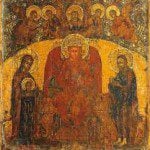In July, I had an opportunity to speak before a group on Wall Street regarding spirituality’s positive impact on ethics. Yeah, talking about values  and inner-wellbeing to professionals in New York’s financial district is like a lamb entering the den of hungry, arrogant, and disdainful lions. I shared fellowship and survived.
and inner-wellbeing to professionals in New York’s financial district is like a lamb entering the den of hungry, arrogant, and disdainful lions. I shared fellowship and survived.
There’s a banner prominently displayed at this weekly gathering. It reads: Is it the truth? Is it fair to all concerned? Will it build goodwill and better friendships? Will it be beneficial to all concerned?
Honest. I’m not kidding. This large banner exists – on Wall Street! Think of the irony – truth, fairness, goodwill, and behavior or activities beneficial to everyone involved. It’s espoused by a community of professionals meeting regularly in a building on a small block, a stone’s throw from the bastion of capitalism – the New York Stock Exchange.
The ethical values outlined above are the guiding principles of Rotary International. The Wall Street chapter is about four years old. It might be a young organization by Rotary standards, but it is offering a clear, much needed message, especially in one of the most important financial districts of the world about how we treat one another.
If you carefully think about Rotary principles, they reflect ethics in action. More important, these values humanize ethics and take them to another level transcending laws, regulations, and internal policies. As I’ve often written ethics must have a human face.
Wall Street isn’t a bad place. It’s a location, a street name. Bad things have happened and continue to happen at this place. Steel and concrete and the edifices dedicated to capitalism, an economic system, only has the life people give it. Buildings, street names, and corporations created as legal entities don’t cause problems. Individuals determine marketing strategies and develop products and services to put in the stream of commerce.
In case you’re not familiar with Rotary, it’s one of the best service organizations with chapters throughout the world. Wear a Rotary pin on your lapel and you’ll be welcomed like a wanted family member anywhere. There are about 1.2 million Rotarians worldwide who come from every social, educational, and professional background.
Rotary started in February 1905, by Chicago attorney Paul P. Harris to foster an exchange of ideas, better the community, and develop and nurture genuine, lasting friendships. Notable members have included US president Warren Harding, Finnish composer Jean Sibelius, Italian inventor Guglielmo Marconi, German novelist Thomas Mann, American explorer Admiral Richard Byrd, and the list goes on.
Although every local chapter has its own special community projects, internationally, Rotary is especially known for its aggressive attempts to eradicate polio. Children in one hundred and twenty-five countries were at risk of acquiring polio. Thanks to Rotary the number is now down to three.
Rotary isn’t about cutting a check. Any person of means can hand out money. Rotary, though it does raise money to fund projects, is about actual service – giving of time, giving of self. You can always fall in love again after a relationship fails or is lost. You can always re-build a dream home if it burns. You can lose a fortune and still make another. You cannot create more time. Its passing means it’s gone forever.
There is something spiritual, defined broadly, about what Rotary does – service, community, building bridges, finding commonality, and acting in one’s personal and professional life with a sense of self that builds up and doesn’t use, exploit, or tear down. Rotary-Wall Street is a shining and much needed beacon of our better angels in the wilds of greed and indifference.
Paul Jesep is an attorney, corporate chaplain, and founder of Corporate Chaplaincy, a firm committed to the spiritual wellness of professionals. He also is author of “Lost Sense of Self & the Ethics Crisis: Learn to Live and Work Ethically”.











